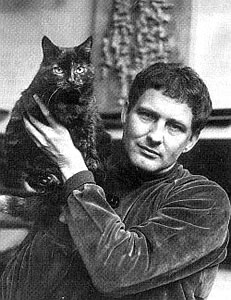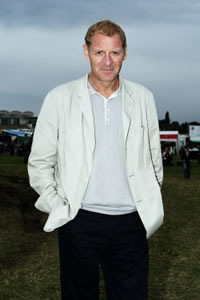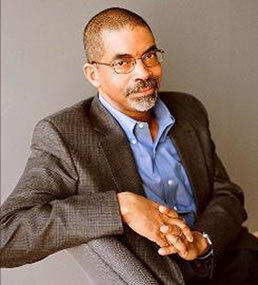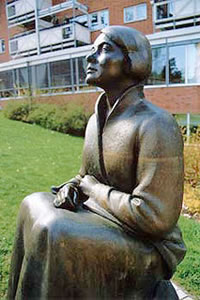De Nederlandse dichter, schrijver en beeldend kunstenaar Jan Wolkers werd geboren in Oegstgeest op 26 oktober 1925. Zie mijn blog van 19 oktober 2007 en mijn blog van 26 oktober 2006 en ook ook mijn blog van 26 oktober 2007 en ook mijn blog van 26 oktober 2008.
De zomer kan me gestolen worden I
De zomer kan me gestolen worden.
Fris groen verschrompelt zinderend tot as.
Mijn vader die vurig gelooft
Dat God zijn goudreinetten stooft
In zonlicht van miljarden jaren oud.
De larf vreet zich tot worm des verderfs,
Begeerlijk vruchtvlees roest tot op het bot,
Het klokhuis wordt een tongewelf van smet.
De ledigheid van liggen in het gras,
De zonnebrand van Onans stuifmeel,
Verkleeft tot donorgift op het gewas.
Op blote voeten zijn de sintels scherp,
De boetedoening is geen vorm van straf
Een legpuzzel van woede stroomt de helling af.
Kalkstenen vlinders
kalkstenen vlinders vliegen naar je toe
de stad zegt met één oog de nacht gedag
straks vlieg ik op de vleugels van je rode haar
over de blauwe halswervel der stad
als een dragonder ga ik in de wolken rijden
maar jij wenkt met je kleine witte hand
een twijfeltorentje van vrees en beven
rijst uit de zwarte bronnen van je ogen
en als ik dichter doffer donkerder je aanrand
sta je te bloeien als een pruimenboom.

Jan Wolkers (26 oktober 1925 – 19 oktober 2007)
De Engelse dichter, schrijver en biograaf Andrew Motion werd geboren op 26 oktober 1952 in Braintree in Essex. Zie ook mijn blog van 26 oktober 2007 en ook mijn blog van 26 oktober 2008.
Ice
When friends no longer remembered
the reasons we set forth,
I switched between nanny and tartar
driving us on north.
Will you imagine a human hand
welded by ice to wood?
And skin when they chip it off?
I don’t think you should.
By day the appalling loose beauty
of prowling floes:
lions’ heads, dragons, crucifix-wrecks,
and a thing like a blown rose.
By night the seething hiss
of killers cruising past –
the silence after each fountain-jet,
and our hearts aghast.
Of our journey home and the rest
there is nothing more to say.
I have lived and not yet died.
I have sailed in the Scotia Sea.
The Last Call
Death called me,
I did not hear.
He spoke again:
Come near.
I went to look
for pity.
Poor death, I thought,
he loves me.
I guessed right,
he does.
And now I love him too,
just because.

Andrew Motion (Braintree, 26 oktober 1952)
De Amerikaanse schrijver Stephen L. Carter werd geboren op 26 oktober 1954 in Washington, D.C. Zie ook mijn blog van 26 oktober 2008.
Uit: Jericho’s Fall
“Darkness bore down on her as the car shuddered up the mountain. Distant lights danced at the edge of her vision, then vanished. Beck wondered how bad it would be. In her mind, she saw only the Jericho she had loved fifteen yeas ago and, in some ways, still did: the dashing scion of an old New England family that had provided government officials since the Revolution. One of his ancestors had a traffic circle named for him in Washington. A cousin served in the Senate. The family’s history was overwhelming; the Jericho for whom Beck had fallen had certainly overwhelmed her. He had been brilliant, and powerful, and confident, and fun, ever ready with eternal wisdom, or clever barbs. She did not like to think of that mighty man ravaged by disease. She had no illusions. She remembered what cancer had done to her own father.
Whatever was waiting, she had to go.
On Saturday afternoon, having cleared her decks with Pfister, Beck took the shuttle from Boston to Washington. She lived in Virginia, a stone’s throw from Reagan National Airport. Her daughter was at a church retreat, church being a thing that Beck did because she had been raised that way, and her mother would be offended if Rebecca dared differ. Beck decided to let Nina stay the night with the other kids. The two of them could ride together to the airport on Sunday, then enplane for their different destinations. Rebecca’s mother, Jacqueline, had been after her for weeks to send Nina for a visit, and maybe this was the time. The child was only in second grade; missing a few days of instruction would do her no harm. Beck hesitated, then made the inevitable call to Florida, to ask if her mother could look after Nina. The conversation soon turned into a battle.
I don’t know how you could even think about taking a six-year-old to visit a man like that.
I’m not taking her, Mom. That’s why I’m calling you.
You said you decided not to take her. That means you thought about it. I don’t understand how your mind works sometimes.
She tried, and failed, to remember a time when she and her mother had not been at odds. Because, in the eyes of her eternally disappointed mother, Beck would never be more than ten years old. Certainly their animosity predated Jericho; and perhaps it had played some sort of role (as every one of the therapists Rebecca had consulted over the years seemed to think) in her falling in love, as a college sophomore, with a married man thirty-two years her senior who tossed away his remarkable career in order to possess her.
I appreciate your help, Mom.
Oh, so you appreciate me now. Does that mean you’ll call more often?”

Stephen L. Carter (Washington, 26 oktober 1954)
De Zweedse dichteres en schrijfster Karin Maria Boye werd geboren op 26 oktober 1900 in Göteborg. Zie ook mijn blog van 26 oktober 2008.
Du sollst danken
Du sollst deinen Göttern danken
für den harten Zwang,
da du ohne Fußspur
irrst auf deinem Gang.
Du sollst deinen Göttern danken
für den schweren Schlag,
da du keine Zuflucht
hast bei Nacht und Tag.
Was die ganze Welt verworfen
ordnet sich im Kreise ein.
Vogelfrei gewinnst du
erst dein eignes Sein.
Ausgesetzt im Sand der Wüste
suchst du nach der Quelle Grund,
und du trinkst am Leben
dankbar dich gesund.
Du sollst deinen Göttem danken
für die zersprengende Qual.
Wirklichkeit und Kern
bleibt dir nur zur Wahl.
Reif wie eine Frucht
Reif wie eine Frucht liegt die Welt in meinen Armen,
sie ist gereift heute nacht,
und ihre Schale ist die zarte blaue Haut, die sich
um sie wölbt,
und ihr Saft ist die süße und duftende, glühende,
sprühende Sonnenlichtflut.
Tief hinein in dies silbemschimmernde Weltall springe
ich als Schwimmer,
getauft in Reife, wiedergeboren zur Fülle.
Geheiligt zur Tat.
Leicht wie ein Lachen
zerteile ich ein goldenes Honigmeer,
das begehrt nach meinen hungrigen Händen.
Vertaald door Hildegard Dietrich

Karin Boye (26 oktober 1900 – 24 april 1941)
Standbeeld in Huddinge
De Ierse dichter Trevor Joyce werd geboren op 26 oktober 1947 in Dublin. Zie ook mijn blog van 26 oktober 2008.
The Fall
I have mouthed names
that are names no longer,
draw no reply now
only hard silence and an image
of graven stone.
Yew-trees, evergreen,
viridian intensity of growth;
gravity derived from dirt.
The names draw no reply,
only a silence in the mind,
movement of smoke.
familiar shadows that are only smoke.
The sun marks time
among the evergreens:
posture of green fire.
Stone cracked in the jaws of ice,
splintered, grinding,
mixed with moisture,
becoming dirt.
There is no grave memorial in carven stone.
There is one gravity.
The names falling from use
down into stone,
down into my mind.
There is no grave memorial in the future of my mind.
All names will fall from use.
Parallax
Figures group on the frozen square,
into the black shadow of flats;
dark path of snow from the abattoir:
and sills of an old debtor’s prison
double this red-gold dusk.
call of a woman, a withered star,
falls, broken, through the resonant light.

Trevor Joyce (Dublin, 26 oktober 1947)
De Amerikaanse schrijver Pat Conroy werd geboren op 26 oktober 1945 in Atlanta, Georgia. Zie ook mijn blog van 26 oktober 2008.
Uit: The Lords of Discipline
„When I crossed the Ashley River my senior year in my gray 1959 Chevrolet, I was returning with confidence and even joy. I’m a senior now, I thought, looking to my right and seeing the restrained chaste skyline of Charleston again. The gentleness and purity of that skyline had always pleased me. A fleet of small sailboats struggled toward a buoy in the windless river, trapped like pale months in the clear amber of late afternoon.
Then I looked to my left and saw, upriver, the white battlements and parapets of Carolina Military Institute, as stolid and immovable in reality as in memory. The view to the left no longer caused me to shudder involuntarily as it had the first year. No longer was I returning to the cold, inimical eyes of the cadre. Now the cold eyes were mine and those of my classmates, and I felt only the approaching freedom that would come when I graduated in June. After a long childhood with an unbenign father and four years at the Institute, I was looking forward to that day of release when I would no longer be subject to the fixed, irresistible tenets of martial law, that hour when I would be presented with my discharge papers and could walk without cadences for the first time.
I was returning early with the training cadre in the third week of August. It was 1966, the war in Vietnam was gradually escalating, and Charleston had never looked so beautiful, so untouchable, or so completely mine. Yet there was an oddity about my presence on campus at this early date. I would be the only cadet private in the barracks during that week when the cadre would prepare to train the incoming freshmen. The cadre was composed of the highest-ranking cadet officers and non-coms in the corps of cadets. To them fell the serious responsibility of teaching the freshmen the cheerless rudiments of the fourth-class system during plebe week. The cadre was a diminutive regiment of the elite, chosen for their leadership, their military sharpness, their devotion to duty, their ambition, and their unquestioning, uncomplicated belief in the system.“

Pat Conroy (Atlanta, 26 oktober 1945)
Zie voor onderstaande schrijvers ook mijn blog van 26 oktober 2008.
De Duitse schrijver Ulrich Plenzdorf werd geboren op 26 oktober 1934 in Berlijn. Zie ook mijn blog van 26 oktober 2006.
De Schotse dichter Sorley MacLean (Schots Gaelic: Somhairle MacGill-Eain) werd geboren op 26 oktober 1911 Osgaig op het eiland Raasay.
De Russische schrijver en theoreticus van het symbolisme Andrej Bely werd geboren op 26 oktober 1880 in Moskou.
